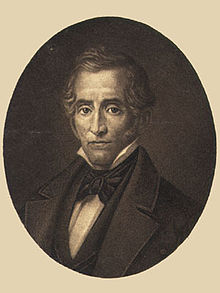Edward D. White Sr.
Edward D. White Sr. | |
|---|---|
 | |
| 10th Governor of Louisiana | |
| In office February 4, 1835 – February 4, 1839 | |
| Preceded by | Andre B. Roman |
| Succeeded by | Andre B. Roman |
| Member of the U.S. House of Representatives from Louisiana's 1st district | |
| In office March 4, 1829 – November 15, 1834 | |
| Preceded by | Edward Livingston |
| Succeeded by | Henry Johnson |
| In office March 4, 1839 – March 3, 1843 | |
| Preceded by | Henry Johnson |
| Succeeded by | John Slidell |
| Personal details | |
| Born | March 3, 1795 Maury County, Tennessee |
| Died | April 18, 1847 (aged 52) New Orleans, Louisiana |
| Political party | Whig |
| Spouse | Catherine Sidney Lee (Ringgold)[1] |
| Alma mater | University of Nashville (LL.B) |
Edward Douglass White (March 3, 1795 – April 18, 1847) was tenth Governor of Louisiana and a member of the United States House of Representatives. He served five non-consecutive terms in Congress, as an adherent of Henry Clay of Kentucky and the Whig Party. He was a slaveholder.[2]
Biography
[edit]White was born in Maury County, Tennessee, the illegitimate son of James White. (Although his parents apparently never married, his father acknowledged him, and the circumstances of his birth did not impede his education or future success.) James White was a delegate to the Continental Congress. While a young boy, Edward moved with his father to Louisiana.
In 1815, White graduated from the former University of Nashville, afterward beginning a law practice in Donaldsonville, Louisiana, the seat of Ascension Parish, south of Baton Rouge. Ten years later, he was appointed by Governor Henry S. Johnson, also of Donaldsonville, as an Associate Judge of the New Orleans Municipal Court in 1825.
In 1834,[3] he married Catherine Sidney Lee Ringgold, daughter of Tench Ringgold, long the U.S. Marshal in the District of Columbia. Their children included Edward Douglass White Jr.
Political career
[edit]Elected to the 21st United States Congress in 1828, White served three terms from 1829 until his resignation in 1834 after being elected as governor. He served a single term as governor (1835–1839). Afterward, he was elected to the U.S. Congress again, serving two more terms from 1839 until 1843.
Lioness incident
[edit]White was among the survivors of the steamboat Lioness explosion that occurred on the Red River south of Natchitoches on May 19, 1833.
Death and burial
[edit]He died in New Orleans and was buried at St. Joseph's Catholic Cemetery in Thibodaux, Louisiana.
His home in Thibodaux is now operated by the Louisiana State Museum as the Edward Douglass White Historic Site.[3]
Family
[edit]White's son Edward Douglass White Jr. was elected by the state legislature as a United States senator from Louisiana. He was appointed as an associate justice of the United States Supreme Court, later appointed 9th Chief Justice by U.S. President William Howard Taft.
References
[edit]- ^ Highsaw, Robert B. (March 1999). Edward Douglass White: Defender of the Conservative Faith. LSU Press. ISBN 9780807124284.
- ^ Weil, Julie Zauzmer (10 January 2022). "More than 1,800 congressmen once enslaved Black people. This is who they were, and how they shaped the nation". Washington Post. Retrieved 5 May 2024. Database at "Congress slaveowners", The Washington Post, 2022-01-13, retrieved 2024-04-29
- ^ a b "E.D. White Historic Site - Louisiana State Museum". Archived from the original on January 17, 2015. Retrieved January 25, 2015.
Sources
[edit]- United States Congress. "Edward D. White Sr. (id: W000365)". Biographical Directory of the United States Congress.
- Political Graveyard
External links
[edit]- State of Louisiana - Biography
- Cemetery Memorial by La-Cemeteries
- Edward D. White Sr. at Find a Grave
- 1795 births
- 1847 deaths
- Governors of Louisiana
- People from Donaldsonville, Louisiana
- People from Thibodaux, Louisiana
- People from Maury County, Tennessee
- Louisiana National Republicans
- National Republican Party members of the United States House of Representatives
- Whig Party members of the United States House of Representatives from Louisiana
- 19th-century American politicians
- Whig Party state governors of the United States
- Shipwreck survivors
- Louisiana politician stubs



